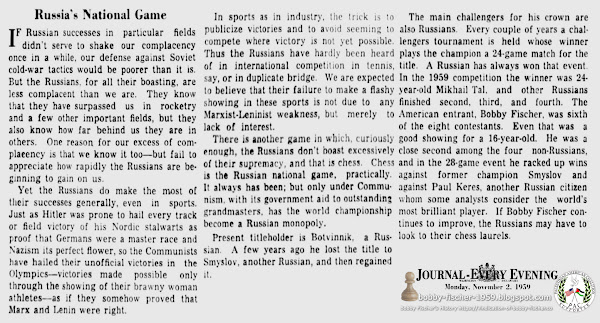The News Journal Wilmington, Delaware Monday, November 02, 1959
Russia's National Game
IF Russian successes in particular fields didn't serve to shake our complacency once in a while, our defense against Soviet cold-war tactics would be poorer than it is. But the Russians, for all their boasting, are less complacent than we are. They know that they have surpassed us in rocketry and a few other important fields, but they also know how far behind us they are in others. One reason for our excess of complacency is that we know it too—but fail to appreciate how rapidly the Russians are beginning to gain on us.
Yet the Russians do make the most of their successes generally, even in sports. Just as Hitler was prone to hail every track or field victory of his Nordic stalwarts as proof that Germans were a master race and Nazism its perfect flower, so the Communists have hailed their unofficial victories in the Olympics—victories made possible only through the showing of their brawny woman athletes—as if they somehow proved that Marx and Lenin were right.
In sports as in industry, the trick is to publicize victories and to avoid seeming to compete where victory is not yet possible. Thus the Russians have hardly been heard of in international competition in tennis, say, or in duplicate bridge. We are expected to believe that their failure to make a flashy showing in these sports is not due to any Marxist-Leninist weakness, but merely to lack of interest.
There is another game in which, curiously enough, the Russians don't boast excessively of their supremacy, and that is chess. Chess is the Russian national game, practically. It always has been; but only under Communism, with its government aid to outstanding grand masters, has the world championship become a Russian monopoly.
Present titleholder is Botvinnik, a Russian. A few years ago he lost the title to Smyslov, another Russian, and then regained it.
The main challengers for his crown are also Russians. Every couple of years a challengers tournament is held whose winner plays the champion a 24-game match for the title. A Russian has always won that event. In the 1959 competition the winner was 24-year-old Mikhail Tal, and other Russians finished second, third and fourth. The American entrant, Bobby Fischer, was sixth of the eight contestants. Even that was a good showing for a 16-year-old. He was a close second among the four non-Russians, and in the 28-game event he racked up wins against former champion Smyslov and against Paul Keres, another Russian citizen whom some analysts consider the world's most brilliant player. If Bobby Fischer continues to improve, the Russians may have to look to their chess laurels.























